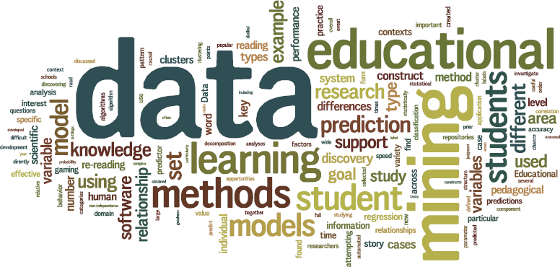Week 7 Educational Data Mining: An Overview

Image credit: pixabay
As a sister field of Learning Analytics, Educational Data Mining (EDM) emerged a few years earlier and has its own disciplinary identity (e.g., a stonger computer science focus, its own professional society, conference, and journal). While two communities developed separately in the beginning, communication and collaboration between two communities (PDF) have increased over the years.
The overlaps and differences between two communities are nicely summarized by Siemens (2013):
Where LA is more concerned with sensemaking and action, educational data mining (EDM) is more focused toward developing methods for “exploring the unique types of data that come from educational settings”. Although the techniques used are similar in both fields, EDM has a more specific focus on reductionist analysis (Siemens & Baker, 2012). As LA draws from and extends EDM methodologies (Bienkowski, Feng, & Means, 2012, p. 14), it is a reasonable expectation that the future development of analytic techniques and tools from both communities will overlap.
We are diving into EDM this week by exploring its connections with LA and playing with various data mining tools used in both communities.

7.1 Meet an Expert
Candace Thille is the founding director of the Open Learning Initiative (OLI) at Carnegie Mellon University and at Stanford University. Her focus is in applying the results from research in the science of learning to the design and evaluation of open web-based learning environments and in using those environments to conduct research in human learning. She took a leave from Stanford in 2018 to work for Amazon. In this talk she gave in 2016, she explored the intersection among the science of learning, data, analytics, and technologies.
7.2 Week 7 Learning Activities
7.2.1 Read, annotate, and discuss
We have two readings this week – one presenting an overview and the other introducing many useful tools.
As always, please annotate and interact as you like.
As we work towards forming our SIGs and course projects, it would be great to think about making some of your annotations more useful for your SIG planning and final project. I encourage you to think about useful tags, e.g., #SIG_social_network, #PROJ_dental_course, and then use them to purposefully tag your annotations. By doing so, we will be able to index our ideas as we continue to engage with all sorts of resources. Again, you may choose to read through an article first and come back to annotate or tag important annotations.
Note: These tags need to used accurately (e.g. spaces and caps matter) in order to be nicely aggregated by Hypothes.is.
7.2.2 SIG Planning
Since we’ve finalized our Special Interest Group plan, please create channels on Slack, invite group members in, and get the planning started.
7.2.3 Register for the next Learning Informatics Webinar
I strongly encourage you to attend the next Learning Informatics Seminar on Oct 27, featuring Dr. Marcelo Worsley. RSVP here!
Let the party begin!

7.3 Bonus video: How to easily export Hypothes.is annotations?
Since some of you expressed an interest in using Hypothes.is in your own research, I made this short video to demonstrate my workflow. Let me know if you have any clarification questions.
References
Romero, Cristobal, and Sebastian Ventura. 2020. “Educational Data Mining and Learning Analytics: An Updated Survey.” WIREs Data Mining and Knowledge Discovery 10 (3). https://doi.org/10.1002/widm.1355.
Slater, Stefan, Srećko Joksimović, Vitomir Kovanovic, Ryan S Baker, and Dragan Gasevic. 2017. “Tools for Educational Data Mining: A Review.” Journal of Educational and Behavioral Statistics: A Quarterly Publication Sponsored by the American Educational Research Association and the American Statistical Association 42 (1): 85–106. https://doi.org/10.3102/1076998616666808.